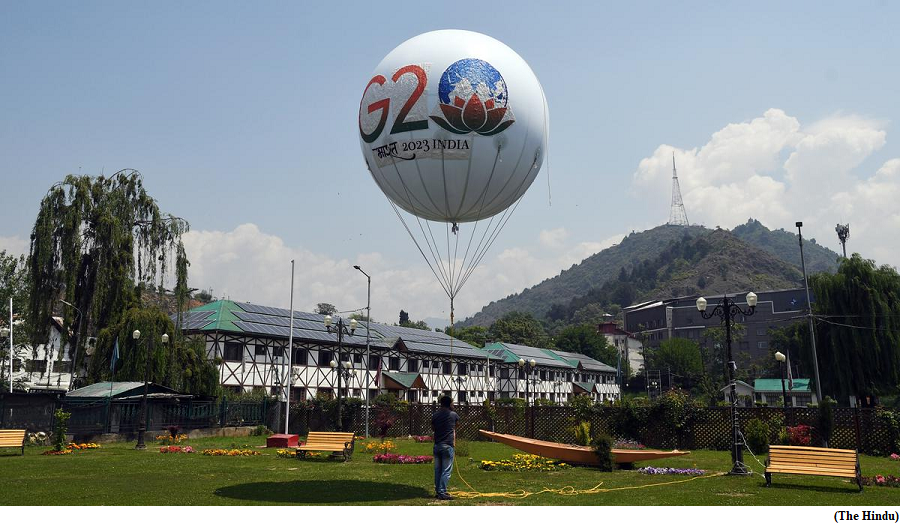The horizon for India beyond the G-20, SCO summits (GS Paper 2, International Organisation)

Context:
- India’s year-long presidency of the G-20, and leadership of the Shanghai Cooperation Organisation (SCO), should not be blind to the persisting challenges the nation faces, due to a series of circumstances.
- It must, hence, tone down the high expectations that are being generated of reaping a rich dividend from helming the two summits.
Deteriorating geo-political climate:
- Priorities listed by India as signifying its presidency, viz., climate change, clean energy, sustainable developmental programmes and reform of multilateral institutions, are likely to take a back seat, given the deteriorating global situation.
- India also needs to be aware that the importance of the G-20 appears to be declining in today’s world. The SCO seems to have somewhat greater traction.
- During its presidency of the two institutions, India may well be called upon to chart a course that balances the contradictory demands of the G-20 and the SCO and even more so that of the Global South.
Two camps and distrust:
- Distrust between the two camps led by the United States and China/Russia, respectively, leaves little scope for countries such as India, that have not declared their allegiance to either camp any room for manoeuvre.
- The U.S. and its allies are meanwhile making a virtue of the fact that they are in a position to provide Ukraine with an arsenal of the most sophisticated weaponry available, alongside provision for training Ukraine troops.
- Today, Ukraine presents a spectacle of possessing substantial quantities of sophisticated modern weaponry. Less obvious is the fact that Russia is also clandestinely receiving equipment and material from its allies, China not excluded.
- The list of potential suppliers of military equipment now includes even countries such as South Korea, risking the threat that supplying arms to Ukraine makes them a participant in the conflict.
China factor:
- For India, apart from the war clouds on the horizon in Europe and tensions in the East Pacific, there are several issues of deepening concern.
- Foremost is how to deal with a China, currently on a major diplomatic-cum-strategic offensive across Asia, especially West Asia.
- This is further accompanied by a display of its naval prowess in the seas around much of East and Southeast Asia, and a flexing of its military muscle in the Ladakh and Arunachal sectors of the Sino-Indian border.
- China is launching several other regional initiatives to checkmate India in the Indian Ocean region, viz., the China-Indian Ocean Region Forum which has seen participation by an overwhelming majority of Indian Ocean states.
- Currently China is targeting India for going closer to the U.S. and the western bloc, for its partnership in the Quad (India, Australia, Japan, the U.S.), as well as its participation in maritime surveillance exercises with the U.S., Japan and Australia.
China in West Asia:
- China is also actively engaged in seeking new friends in India’s extended neighbourhood, in a bid to limit India’s influence in this region.
- West Asia, once a region where India’s influence was preponderant, appears to be fast yielding to China’s muscular and diplomatic offensive.
- Notwithstanding India’s attempts to reach out to erstwhile friends such as Egypt (the Egyptian President was the chief guest at the Republic Day parade this year) India seems to have been sidelined, given the major churn in West Asia, much of it on China’s initiative.
- The new China brokered Iran-Saudi Arabia entente is setting the stage for major diplomatic shifts across the region, marginalising India and certain other nations.
- India is well aware of China’s ability to embark on hybrid warfare, including the adoption of cyber tactics, engage in the ‘politics of water’ by re-directing the Himalayan rivers, and adapting to modern conditions the tactics popularised by the Fifth Century BCE Chinese Strategist, Sun Tzu, of ‘winning wars without fighting through avoiding the enemy’s strength and attacking his weaknesses’.
India’s neighbourhood:
- Other turmoils in India’s immediate neighbourhood in South Asia, compound India’s problems. The situation in Afghanistan appears to be steadily worsening. Events in that country are now beginning to affect nations on its periphery.
- India has, meanwhile, lost all traction with the Taliban in Afghanistan. Pakistan and Sri Lanka, to different degrees, represent ‘worst case’ scenarios.
Russia factor:
- India’s relations with Russia also appear to be entering a prolonged phase of uncertainty. Russian ties are not necessarily anchored in defence cooperation, but this has been a key factor in cementing their relations.
- As India looks more to the West, specially the U.S., for state-of-the-art weaponry, the inevitability of the relationship can no longer be guaranteed. With the Russia-China strategic relationship getting stronger and both countries openly giving vent to their belief in the utility of such a relationship, strains are inevitable in India-Russia relations.
- Russia’s unequivocal attack on the Quad during the SCO Defence Ministers meeting in New Delhi recently, is a pointer to the winds of change that are becoming evident.
- In the meantime, other pacts involving Russia, such as the Tripartite Russia-India-China platform and BRICS, have lost much of their dynamism.
- The economic content of the bilateral relationship is limited, and for the present linked to trading in oil, imparting little dynamism to the relationship.
Way Forward:
- India is one of the few countries in the world which has managed to emerge from the COVID-19 pandemic and the resultant economic crisis without much damage, and is widely seen as a prospective global power, it has much to do before it attains this pinnacle.
- There are many obstacles that have to be overcome before India can achieve its predetermined goal. Well before this, and notwithstanding its fortuitous position of helming both the G-20 and SCO simultaneously, India should not claim to have attained its goal.


